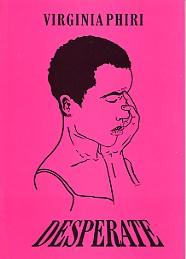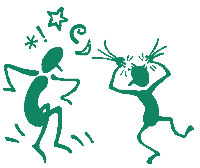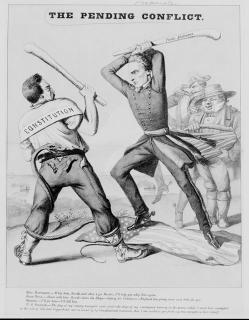
There are three political forces in the country: Monarchists, Maoists, democrats. So far each has been operating independent of the other, although attempts have been made by each camp to get one or the other to join them. The king in the past has tried to get the democrats to join him against the Maoists. The Maoists have constantly tried to get the democrats to join them to throw away the monarchy. And the democrats, mainly the Nepali Congress, in the past has tried to use the king's army against the Maoists, without success.
The stalemate continues as each camp seems to think it can gain more ground by refusing to enter into dialogue. Seeking dialogue has been thought of as a sign of weakness.
The king has expanded his personal power base as seen in increased state allowances to the royal family and his current direct rule. The Maoists have broken up the scant state structure in much of the countryside and can be said to be in de facto control. Both the guns have expanded their power bases at the expense of the democrats.
The democrats, on their part, have done nothing much to steal the political and social thunder of the Maoists. And they have not come anywhere close to republicanism so as to hit back at the monarchy ideologically.
So far the Monarchists are center stage. It is as if the insurgency has been a boon to them. Royalist ministers talk as if they expect the king's direct rule to stay on for at least three years, perhaps beyond.
The king, on his part, seems eager to soothe the rough edges, make cosmetic changes, but make no basic compromise. Chances are he will not be able to fool the international community, his target audience. Instead he is alienating the two forces he will end up having to do business with as things hot up.
The king seems to be counting too much on the fact that the Maoists might have been quite a menace, but they are nowhere close to taking over any of the district headquarters, let alone the national capital.
That is where the newly launched democratic movement comes in. The parties don't have guns. But street demonstrations can go a long way. If the king will not listen to reason, he will perhaps listen to the streets.
The Monarchist strategy seems to be do deal with the Maoists politically only if their military victory is imminent. By then, it might be too late. And that strategy does not take into account the democrats, a force slow to warm up, but once it does, it is the strongest.
In The News
- New libraries spring up in Nepal's furthest corners Christian Science Monitor Foreigners come to Nepal expecting a land of magic, mountains, and Brad Pitt...... until the 1960s, access to education was limited to the royal family and its retinue....... It costs about $20,000 to build each library and to supply it with 3,000 to 5,000 books written in Nepali and English..... the Jhuwani library's new computer center, where a dozen terminals and workstations were arrayed in as orderly a fashion as they would be in any suburban high school classroom in the United States.
- Nepal’s civil war: from security to politics Open Democracy, UK some sort of political rapprochement between the wayward and outdated Nepali political parties and the monarchy might take place .... these parties and their leaders have nothing much to offer except “protest and demonstration”, which in the present circumstances is only going to strengthen the rebels ..... India.. fears that in a few years some of its own states (Bihar and Andhra Pradesh) will be as red as Nepal.....prioritises stability rather than democracy in Nepal..... The Maoist movement is not going to wither away. It is a real political problem that needs real work to solve and the solution will only come through negotiation...... A new factor in this situation is the Nepali diaspora and a new generation ..... diasporas now play a great role both in fomenting and containing the conflict..... The fundamental characteristic of the Nepali state, since its very formation in 1768, is that of conflict within the ruling class...... all the achievements went swiftly downhill when the first Nepali Congress government poured cold water on the spirit of the people’s movement ...... Not one post-1990 government completed its term in office ..... The social alienation based on caste, religion, ethnicity, gender and uneven and centralised development policy all helped fuel the movement...... Charismatic leaders like Baburam Bhattarai ..... These young people, indoctrinated by a Maoist rhetoric of a utopian, just society, took up arms against their own clans while the ruling class in Kathmandu remained in deep slumber...... Central governments in Kathmandu regarded the situation as a law-and-order rather than a political challenge, and started to suppress the movement. They never tried to correct their own mistakes and bring Maoists into the mainstream..... Nepali political parties and governments..... failed to establish good relationships with Nepal’s bureaucracy, monarchy and security forces (all of which have grossly discredited the image of successive governments)...... For the government, it is terrorism; to the Maoist it is liberation from feudal rule; for some others it is a case of “revolutionary romanticism”...... the insurgency as a communist revolution or as an ethnic alliance against high-caste, Hindu-dominated political elite...... not an ideological war because Maoists have always been willing to come to terms ...... the assertive royal palace backed by the army ...... Rebellion was inevitable, given an environment of rampant corruption and injustice coupled with extreme poverty. ..... the excessive behaviour of post-1990s political leaders..... the role of the international community – particularly the US, Britain and India – in fuelling hostilities by supplying arms, cannot be dismissed. ...... The Maoist movement seems to have been supported by various clandestine revolutionary groups from neighbouring countries and beyond; and the international community’s ever-increasing interest in Nepal prompts speculation as to whether interference has worsened or helped mitigate the conflict..... Civil society, political parties and even the king have failed to bring these actors into a common platform to address the Maoist problem ..... unholy compromise between elected politicians and selected elites ..... parliamentary political parties (who in theory believe in representative democracy, but have neglected to assimilate social movements into the system) ...... the only chance for peace in Nepal lies not in “stability” but in a genuine democratic politics.
- Largest Anti King Rally In Nepal
SouthAsia Network Police in riot gear were posted around the market, but did not intervene.
- Maoists bomb top army man's house in Nepal Sify, India Brigadier General Deepak Gurung's house in Kawasoti village, Nawalparasi district, southwestern Nepal, was "badly damaged in the bomb attack" ..... three suspected Maoists riding a motorcycle carried out the bombing before escaping ..... Maoists also attacked Gurung's house two years ago
- ‘Land pooling started for 2nd int’l airport’
Gorkhapatra the government would build the second international airport of the country in Bhairahawa within three years ..... Gautam Buddha international airport .... the government would initiate development programme in Lumbini and the people would find it a different place within a year. .... no heritage sites of the Kathmandu valley would remain in dilapidated state in five-year time. ..... About the condition of the Royal Nepal Airlines Corporation (RNAC), he said that it had been affected by cancer
- NEPAL: Rally organisers ask resignation of Gorkhapatra editor Asia Pacific Media Network, CA In a democracy, people are allowed to criticize. But to denounce one’s nationality and the head of one’s state is not a democratic value, he reportedly said....... Sujata Jost spent thousands of dollars to spread rumors about Nepal. On Sunday’s demonstration, she spent $50 a head to bring each person there .... Ganga Chaulagain, who has denied the quote
- King’s army grapples with desertion Calcutta Telegraph, India ..... suspicions that the Royal Nepal Army (RNA) is manned by straw soldiers...... The king’s army is grappling with desertions forced by threats from Maoist rebels. For any army in the middle of a war, desertions are a corrosive danger...... “He told me that he had quit the RNA because it did not pay him enough to meet the extortionate demands of the Maobadi,” Mukarji said...... evidence from Nepal on the weakness of the RNA has been mounting...... estimated the total number of desertions by RNA soldiers at “between 200 and 300 a month”..... ..... “the insurgency has riven families”....... Mehta estimated that the Maoists’ army had a strength of 8,000 to 12,000 fighters but only 4,000 weapons. “They have the power of intimidation, the power to strike fear but very little fire-power.” ..... RNA .... some of its best and most important fighting units are stationed inside the Narayanhiti compound in Kathmandu and are effectively a palace guard....... the RNA has improved its defensive tactics but it is not taking the battle to the Maoists. ..... Of late, the Maoists have targeted the families of Royal Nepal Army personnel. They have extorted money, locked up the houses and seized the property of RNA personnel. As a result, the families of RNA personnel have been impelled to flee their villages overnight to safer places ...... The violence against the families of RNA personnel has increased especially in the insurgency-hit districts ...... The RNA says altogether 292 families of RNA personnel have fled their villages since February 1
- The Nepal Problem The Asian Wall Street Journal .... now more than 100 days since King Gyanendra unleashed his assault on democracy ..... instated emergency powers that made Nepal effectively an absolute monarchy ..... The Maoist rebellion has continued largely unabated ..... the only bright note of the 100 days was that the Maoists and the royal government both agreed to allow the United Nations to deploy a relatively robust human-rights monitoring mission in the field ..... Nobody wants Nepal to collapse under a Maoist onslaught, and the king has done everything he can to paint himself as the last bastion of defense against the Maoists...... One hundred days of royal rule have proven that the king was being honest when he said he did not have much of a plan
- Statement By 25 Human Rights Organizations INSN ..... should the regime appoint members of the NHRC, they would engage in pleasing the current regime, completely undermining the indispensable norms of the Paris Principles such as independence, impartiality, efficiency and professionalism...... attempt of the regime to enforce the “Amendment to Nepal Acts related to Media Laws” that aim to curtail free and fair news reporting and publication..... demonstrate the actual end of the “state of emergency.”
- When A Family's Future Is On The Line The Washington Post My father-in-law has vowed that if the Maoists ever try to force his grandchildren into their ranks, “I have a sword, I’m an old man, and I’m not afraid of dying.” ..... my father-in-law, a village priest, had chanted through much of the 26-hour flight to ensure the plane stayed in the air .......My mother-in-law had never before seen a traffic light, but was soon asking trenchant questions about American life: Why was it that only women seemed to work as store clerks? Why are all the road workers black? ...... Soldiers were coming by day and warning, “You’re either with us, or with the terrorists.” Rebels came by night and said the same thing. ....... An entire village of low-caste potters’ huts near our village was reportedly burned to the ground....... There must be countless Washington families who have gone through these same tense moments: Rwandans, Sudanese, Peruvians, Guatemalans. ...... my mother was in elementary school when the Nazis swept through Poland, where most of her family still lived...... when armed men are bent on violence, there’s nothing a relative half a world away can do....... The mob went on its way, the soldiers still marching beside them.
- Syangja: Maoists Preparing To Take Students INSN Maoists are training the students in different schools of village areas in the name of giving janabadi (people’s) education...... a Maoist cadre had ordered girl students to cut their hair and wear jeans pants ...... A student said they would come and select the strong students and take those students with them. ...... he just said it is a time of war between two rifles, so the people may need to bear risk and in the war for their right they may need to pay a high price at any cost also
- Mass Meeting Pamphlet INSN
- Fear Of Freedom Or Freedom From Fear CK Lal Nepali Times Madhab Nepal ... he wants the future of monarchy to be a topic of national debate. ..... Sher Bahadur Deuba ....He was persuaded that a chronically squabbling parliament was a hindrance to fight the Maoist menace...... Whatever you may say about Girija Prasad Koirala, at least he has been consistent in his main demand – restoration of parliament as a point of departure for progressive changes in the polity. Now, seven mainstream parties representing 95 percent of parliamentary strength have supported this demand. The Europeans, Indians and the Americans welcomed this new-found unity among the parties and have finally realised the folly of supporting the needless political experiments of the last three years...... the head-in-the-sand attitude of Kathmandu’s ruling elite about February First persists ..... flex administrative and financial muscle to muzzle the media in excesses that transcend the Panchayat. ..... 22 May 2002—the day Deuba dismantled parliament and announced elections he knew could never be held. ...... The royal takeover is defended by fanning fears of a Maoist takeover. ...... a democratic and progressive Nepal is sure to emerge from this churning........ it’s time to restore due process under the constitution through a reactivated lower house.
- Parties Protest Nationwide NepalNews.com ...... reinstatement of the dissolved House of Representatives, formation of an interim government to hold peace talks with the Maoists and hold constituent assembly elections to draft a new constitution, if necessary...... Though security was on high alert, there was no intervention during the rally...... thousands participated in peaceful protests in Biratnagar, Jankapur, Birgunj, Jaleswor, Gaur, Malangwa, Pokhara and Dhangadi.
- Trouble In The Mountain Kingdom Humanscape.org .....India is a key player in Nepal and has, by oiling the monarchical-army machinery from late 2001, contributed to the crisis..... investing so blithely on the force that is on the losing side of history ...... 1 February 2005 can only be described as a royal military-palace coup...... The king was not constrained by the constitution of 1990 since its provisions were not adequate to prevent a monarch from defeating its very spirit and letter...... the Maoists seemed to only get stronger ...... Nepal registering the highest number of newly recorded disappearances in the world, rapes, extra-judicial killings, torture, displacement, illegal arrests and detentions ...... state actors registered the victory in accumulating the figures ...... The Maoists had guns, but were ideological and political. The RNA had only guns and the aim of preserving status quo. It was not an equal battle...... The problem is with the structure of the RNA. It is an unprofessional fighting force, with a feudal structure, fit for ceremonial functions, at best as a palace army..... The Nepali official language is only known to 42 per cent contributing to a 60-70 per cent failure rate in the school leaving certificate...... the biggest obstacle to the peace process is the monarchy-army. ......
- Of Holes In Socks And Blank Newspapers Humanscape.org Take a good measure of emergency flour. Sift thoroughly to remove all resistance. Knead with exhortations of national security. Grill and set aside. Wash a dozen journalists and wring thoroughly. Don’t forget to strip away fundamental rights before you pop them into boiling water. Add a liberal measure of censorship guidelines. Sprinkle a dash of detentions. Grate a generous amount of intimidation. Stir in a few threats to withdraw advertisements and licenses. Simmer on low flame. Garnish with rhetoric of ‘tackling the Maoist problem’. Serve hot.









